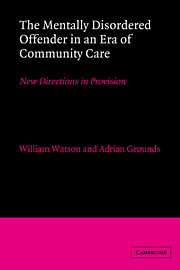Book contents
- Frontmatter
- Contents
- Conference participants
- List of tables and figures
- Preface
- Part I Introduction
- Part II Future directions for psychiatric services and mental health law
- Part III Perspectives on future needs
- Part IV Planning and implementing new services
- Part v A concluding review
- 15 Future directions for research
- Refences
- Tables of cases
- Index
15 - Future directions for research
from Part v - A concluding review
Published online by Cambridge University Press: 05 August 2016
- Frontmatter
- Contents
- Conference participants
- List of tables and figures
- Preface
- Part I Introduction
- Part II Future directions for psychiatric services and mental health law
- Part III Perspectives on future needs
- Part IV Planning and implementing new services
- Part v A concluding review
- 15 Future directions for research
- Refences
- Tables of cases
- Index
Summary
The papers and the subsequent discussions which made up the 1990 Cropwood Conference covered an enormous range of issues concerning the situation of mentally disordered offenders in the era of community care. It is not the purpose of these concluding remarks to summarize all these issues, but to draw out certain important themes about which useful comments might be made after the reflection induced by putting together this report of proceedings. The whole conference effort remained true to the brief of outlining possibilities for future provision. Indeed, the event was remarkable for the tenacity and depth with which a broad, even disparate group of committed people, all ‘representatives of good practice', tackled the problems encountered in the provision of services for a very marginalized client group. These comments will also be addressed directly to issues central to the futures of this important minority of disadvantaged citizens for whom both the psychiatric and criminal justice systems must strive to cater.
Researching the current situation of mentally disordered offenders
Almost every participant demanded an increase in the quantity of research undertaken concerning mentally disordered offenders. Indeed, representatives of a number of bodies indicated their interest in sponsoring or co-ordinating some of this effort. On what conceptual bases should such work best be founded? Of course, a number of different methods and perspectives will ideally be brought to bear on the issues. However, one idea was referred to in many contexts; that of the mentally disordered offender's ‘career’. The concept renders inadequate any simple focus on clearly delineated and significant episodes such as discharge from hospital, arrest, conviction, sentence, etc. There needs to be an attempt to understand the complex ways in which some individuals become channelled through particular institutional and extra-institutional careers. When applied to the development of services, this approch can lead to a specific form of evaluation: how can future provision be organized, not merely so that it is flexible, and in some undefined way ‘tailored’ to the individual, but also so that the consequences of particular decisions do not create new forms of career structure which lead to or maintain the mentally disordered as an offender? Dr Fowles’ paper, and the subsequent discussion, gave clear indication that routes to inappropriate placement cannot be deduced from a simple analysis of changes in global institutional statistics.
- Type
- Chapter
- Information
- The Mentally Disordered Offender in an Era of Community CareNew Directions in Provision, pp. 191 - 200Publisher: Cambridge University PressPrint publication year: 1993
- 3
- Cited by



